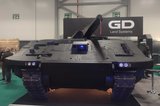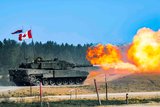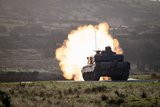Poland receives more Rak mortar carriers
Poland has obtained eight more Rak mortar carriers. (Photo: Polish MoD)
Poland has taken delivery of a further eight RAK 120mm mortar carriers and four artillery command vehicles.
The Rak 120 mm SP mortar turret is mounted on the chassis of Poland’s Rosomak 8x8. The latest vehicles join the Polish Army’s 12th Mechanized Brigade.
Poland signed the first order for the Rak system from Huta Stalowa Wola in April 2016, consisting of 64 turrets and 32 command vehicles. Deliveries for the first batch took place between June to November of 2017.
Poland signed a follow-on contract for a further 18 Rak mortars and eight command vehicles in October 2019. The recently delivered vehicles are a part of this order. Deliveries were initially scheduled for between 2020 and 2021.
In April last year Poland placed another order for 40 more Raks and 20 command vehicles.
In total, Poland has ordered 122 M120K Raks and 60 command vehicle variants.
Related Equipment in Defence Insight
More from Land Warfare
-
![US DoD task force’s DroneHunter acquisition lays groundwork for Replicator 2 CUAS strategy]()
US DoD task force’s DroneHunter acquisition lays groundwork for Replicator 2 CUAS strategy
As the US Department of Defense looks to counter the growing threat of uncrewed aerial systems to improve homeland security, the DroneHunter acquisition could point to future commercial innovation.
-
![Land forces review: Tanks, trucks and IFVs dominate but woes remain for Ajax]()
Land forces review: Tanks, trucks and IFVs dominate but woes remain for Ajax
This year has begun with main battle tanks taking the lead while orders for large logistics and support vehicles continued from last year. Additionally, two of the British Army’s most significant contracted vehicle programmes, Ajax reconnaissance vehicle and Challenger 3 tank, continued to make news in January.
-
![Canada looking to expedite purchase of armoured fighting vehicle and a new tank]()
Canada looking to expedite purchase of armoured fighting vehicle and a new tank
Canada is improving its Leopard main battle tank fleet but before this is fully completed, it is expected to begin looking for new vehicles.
-
![Layered protection: How air defence is adapting to rising drone and missile threats (podcast)]()
Layered protection: How air defence is adapting to rising drone and missile threats (podcast)
A surge in aerial threats – from advanced missiles to low-cost drones – is reshaping the way militaries approach air defence, driving demand for flexible, multi-layered solutions.
-
![UK agrees parallel development and production process for British Army Challenger 3]()
UK agrees parallel development and production process for British Army Challenger 3
In a bid to accelerate delivery of the British Army’s Challenger 3 main battle tank, which has just carried out its first crewed firings with the latest Rheinmetall 120mm L55A1 smoothbore gun, the UK has opted for an unconventional approach.






















